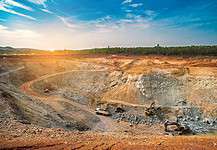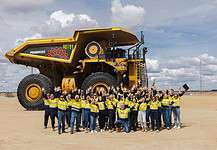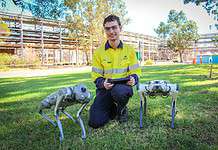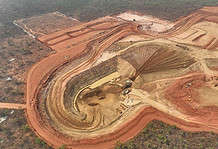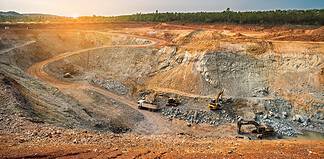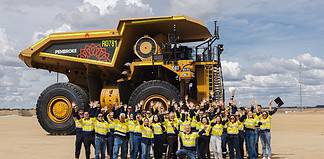BY REUBEN ADAMS
SECURING a buyer for the Whyalla-headquartered steel manufacturer is a victory for the 5500 jobs related to Arrium’s operations, the Whyalla business community, and the State of South Australia.
In early April 2016 Arrium pleaded for a $US927 million lifeline from its lenders. Australia’s four banks, several global banks and US bondholders rejected the proposal, pushing the struggling Group into voluntary administration, owing its creditors more than $2.8 billion.
Arrium employed about 5500 workers across its mining, steel and mining consumables business units, which included a 1.2 million tonnes per annum (mtpa) steel plant at Whyalla on South Australia’s Eyre Peninsula, smaller plants in Melbourne and Sydney, and a 12mtpa iron ore mining operation in South Australia’s Middleback Ranges.
The lengthy voluntary administration process meant the future of Arrium’s direct employees was uncertain.
As Arrium is its largest employer, the city of Whyalla was particularly affected; of a population of about 22,000 people, 1600 were direct employees. Thousands more were contractors.
If Arrium failed, many believed Whyalla and – to a lesser degree – the State of South Australia would fall into economic and social crisis.
From an operational perspective it was business as usual for Arrium as the administrators moved forward selecting preferred bidders for the Group, and Local, State and Federal Governments scrambled to coordinate a cohesive response.
In June 2016 the South Australian Government sweetened the deal of any prospective buyer, committing $50m to support the new owner upgrade the Whyalla steelworks.
In Parliament, Premier Jay Weatherill called for a bipartisan commitment from both major Federal parties to contribute $100m towards the funding facility to give the Whyalla steelworks the best chances of a long-term future.
The $10m Whyalla Small Business Loan Scheme was also launched to support small Arrium suppliers experiencing cash-flow challenges as a result of Arrium entering administration.
Marketing efforts for the Arrium Australia business kicked off during August 2016.
After much back and forth, on 30 March 2017 the Administrators shortlisted two unnamed bidders – both wanted the entire business – to progress to the next stage of the process.
The Korean consortium led by POSCO and UK- based GFG Alliance were soon revealed as the two short-listed bidders.
On 15 June, the administrators announced it had chosen the Korean consortium as the “preferred bidder”.
The consortium, headed by Newlake Alliance Management and JB Asset Management, was supported by steelmaking giant POSCO, which had already attempted a $1bn takeover for Arrium in 2012.
Back then, POSCO had proposed spending up big on new technology at the Whyalla steelworks to replicate the modern steelmaking process used at its Pohang steelworks in South Korea.
The Korean consortium was in the box seat, but then – a curveball.
GFG Alliance, led by Gupta Family Group executive chairman Sanjeev Gupta, submitted a modified offer on the night of Tuesday 4 July, after the exclusivity period granted to the South Korean consortium expired on the Friday prior with no deal reached.
A binding agreement was signed the following day, ending 15 months of uncertainty for the people of Whyalla.
“Taking all factors into consideration, including the timeframes required to complete a sale, the Administrators and sale advisers Morgan Stanley, decided the GFG Alliance offer was superior to the conditional offer of the Korean Consortium with whom we were negotiating,” Deed Administrator Mark Mentha said in a statement.
The acquisition was expected to secure the jobs of more than 5500 Australian workers, and included the 10mtpa iron ore mining operations; Whyalla port and rail; the 1.2mtpa Whyalla Steelworks; the OneSteel steel Scrap Recycling business; 4mtpa OneSteel Secondary Steelworks; Australian Tube Mills; and OneSteel Reinforcing, ARC and OneSteel Metal Centres.
A landmark acquisition
A key player in the transaction was accomplished Melbourne-based metals and mining executive Michael Morley, who was appointed to lead GFG Alliance’s drive into Australia in April this year.
Mr Morley joined GFG as development director for Australia following a decade with Nyrstar, the Belgian-listed global mining and multi-metal processing leader, where he was senior vice-president for metals processing
The respected merger, acquisition and restructure specialist has a track record of securing and implementing high-profile deals for the industry across the globe, most running into hundreds of millions of dollars.
But his local experience was also crucial; he led the US$500m flagship project to completely revitalise the ageing Port Pirie lead smelter in South Australia, and even played a key role in the $US1.2 billion merger between the Smorgon Steel Group and OneSteel in 2007.
“I have a reasonably good sense of the importance of the Upper Spencer Gulf to South Australia and have been privileged to develop good relationships with many people in Government.
“[This] has no doubt assisted our ability to develop a plan for Whyalla, progress discussions with both Governments and reaching agreement in relation to the acquisition of Arrium with the administrators,” Mr Morley told The Australian Mining Review.
Mr Morley said he was always confident that the GFG Alliance proposal was the best solution for all stakeholders; including employees, employee representatives, the local community of Whyalla and both Federal and State Governments.
“We had developed a comprehensive, relatively low risk plan, to sustainably improve Whyalla performance,” he said.
“The GFG Alliance had a track record of operational improvements and turnarounds, string relationships with stakeholders, and certainty of execution.
“It was a journey, and our perseverance should be seen as proof of just how passionate and committed we are to creating an exciting future for the business.”
The deal represented a major step forward in the Group’s strategy to establish a market-leading business in Australia.
“We are thrilled, this is a landmark acquisition for the Group and one that we have been working on for quite some time,” Mr Morley said.
“It is perfectly aligned with our strategy and, looking forward, we continue to explore opportunities to further grow our presence in Australia in adjacent and complimentary industries, including renewable energy, metals and mining.”

A transformation specialist
GFG Alliance is an international group of businesses founded by the British Gupta Family.
The Arrium acquisition builds on GFG Alliance’s track record of distressed asset acquisitions and turnarounds in the UK, where it has become key player in the industrial, energy, property and financial sectors.
In the last 18 months the Group has spent up big on UK assets through its Liberty House (steel, aluminium and engineering), SIMEC (energy, infrastructure and resources), GFG Estates and Wyelands (banking, capital and advisory) businesses.
In 2016, Liberty bought Rio Tinto’s Lochaber business in Scotland for $300 million GBP, allaying fears that there would be job losses among the 150 staff and hundreds more contractors in the process.
In April this year, Liberty House acquired Tata Steel’s struggling speciality steel business for $100 million GBP; not only safeguarding about 1700 jobs, but adding 300 more.
It’s a common story for GFG and the enigmatic Mr Gupta.
In May, Mr Gupta was recognised for his relentless drive to transform the steel industry in the UK and beyond, winning ‘CEO of the Year’ at the prestigious S&P Global Platts Global Metals Awards in London.
Chosen from a shortlist of ten top metals industry executives, the judges’ citation said they were “impressed by his track record of successful acquisitions and his role as a motivator willing to swim against the tide of pessimism prevalent in the industry”.
Mr Gupta’s vision was to create a vertically integrated and sustainable industrial business encompassing mining, metal recycling, primary metal production, engineering and distribution and the use of renewable energy.
The Arrium business fit perfectly with this strategy.
Mr Morley said Arrium was well placed to play a significant role in the expected growth in infrastructure spending in Australia over the coming years.
“The business is endowed with an experienced and skilled workforce, well-run operations, strong brands and long-established customer relationships and we look forward to exploring opportunities to grow the business further,” he said.
“Whilst the Whyalla Steelworks has faced well-publicised operational and financial challenges over recent years, we have developed a comprehensive plan to secure its long-term future and that of the local community.”
This plan focussed on reducing iron ore feed costs, modernisation investments, energy generation, expanding production and creating high value export opportunities.
“We are particularly excited by the opportunity for the Whyalla Steelworks to directly supply intermediate steel products to our UK rolling mills that are currently sourced from third parties,” Mr Morley said.
In mid-July Mr Gupta toured the Arrium assets.
Meeting steelworkers at the Whyalla integrated plant on 17 July, Mr Gupta praised the ‘patience and resilience’ of the Arrium workforce, and said the acquisition put an end to a period of prolonged uncertainty.
“It allows them to look more confidently to the future as they become a part of our large and multi-skilled alliance of international businesses,” he said.
The senior GFG team spent several hours at the Whyalla plant discussing strategies for the recovery of the business.
This included discussions on renewable energy generation – both for the steelworks itself and the South Australia grid.
“We have developed a comprehensive plan that we are confident will secure a long-term future for this operation and the community who depend on it,” Mr Gupta said.
The community
Whyalla Chamber of Commerce (WCCI) President Ron Hay has lived in Whyalla since 1963, where he worked for BHP and then Onesteel for almost 44 years.
He said mining and manufacturing businesses was a cornerstone support for the broader business community.
“The reason Arrium is important is that it brings other businesses and people to the community,” he said.
“We would lose population if that business was not here, and with that population we would also lose a skill base.
“It also then means that it jeopardises other services within the community. It’s difficult to attract those and other services back into the community once they are gone.”
In a statement Whyalla Mayor Lyn Breuer called the last 18 months one of the most difficult periods in Whyalla’s history – and Mr Hay agreed.
“It has been one of the most difficult times. 1800 people were made redundant in 1978 when the shipyards closed,” he said.
“Some of those people were absorbed into the steelworks, others decided to leave town. Smaller businesses who supported the shipyard closed or downsized their operations.
With Arrium it was difficult because of the nature of the situation – with the business being in voluntary administration – for businesses, the people that live here, and the employees.
“It was a very, very difficult period of uncertainty.”
Moving forward, GFG Alliance intends to spend an estimated $1bn on the steel plant and associated infrastructure – including a power plant capable of feeding extra electricity into the South Australian grid.
The certainty that came with the GFG agreement has injected a sense of confidence back into the community, Mr Hay said.
“Undoubtedly so. When we first received the news [the buyer] was different to what we first thought; that was a bit unexpected considering what had been in the media and what we had been briefed on,” he said.
“But the confirmation of the signing of a binding agreement has brought a level of confidence back into the community.
“People can now see some light at the end of the tunnel; they can see that we are moving forward on a new path for this community.
“More importantly, what it has shown is that over the 15 or so months, the community of Whyalla, the business community has done it tough, but they have taken it in their stride.
“The next step is as a chamber to engage with the new owner so that we understand their plans for moving forward. They have a vision; we need to understand that vision and how it is going to be a part of Whyalla.”
GFG is currently focused on achieving completion by the end of August, and putting robust plans in place so that it can “hit the ground running”, Mr Morley said.
“With plans to expand the business in the short to medium term, more jobs will likely be generated,” he said.
For Arrium, the future is promising. The Government’s ramp up in infrastructure, including the Melbourne-to-Brisbane inland rail line, will boost demand for Arrium’s products, while a contract to provide steel for Adani’s Carmichael Coal Mine in Queensland is worth $74m.
Mr Hay said there was now opportunity for fresh financial investment into the community.
“The economic opportunity that will be created over the next 6 to 18 months puts a lot of focus on Whyalla,” he said.
“It creates wealth within the community. It doesn’t matter what business you are running, there is the potential for money being spent across a range of businesses.
“The future of Whyalla looks a lot brighter.”


